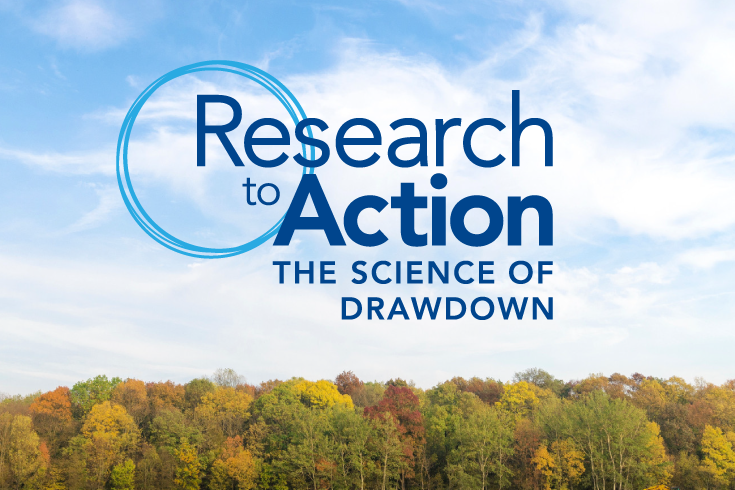
Penn State, in partnership with Project Drawdown, will hold the first international conference on climate solutions, based on the 2017 New York Times best-seller “Drawdown, The Most Comprehensive Plan Ever Proposed to Reverse Global Warming.” The conference, titled “Research to Action: The Science of Drawdown,” will provide opportunities to learn about and discuss the science underlying Project Drawdown’s portfolio of 100 solutions to reverse global warming.
The three-day conference will include analysis and review of individual solutions — ranging from renewable energy and energy efficiency to forests, agriculture and food systems; provide a forum for documenting and advancing the science of positive climate solutions; and serve as a platform for discussing future research initiatives. The event will be held Sept. 16 to 18 at the Penn Stater Hotel and Conference Center, located minutes away from Penn State’s University Park campus.
The term “drawdown” refers to the time at which concentrations of greenhouse gases in the atmosphere begin to steadily decline, ultimately reversing global warming. Project Drawdown is a nonprofit research and communications organization focused on reversing global warming through comprehensive analysis of strategies that can be pursued by individuals, communities, companies and governments. Its results were first shared in the 2017 book “Drawdown.”
“We are thrilled to be partnering with Penn State in hosting this groundbreaking conference,” said Chad Frischmann, vice president and research director at Project Drawdown. “Our intention at Project Drawdown has always been to share our research and methodologies with researchers from many disciplines who can make a difference in reversing global warming.”
“This will be the first coming together of our collaborative of researchers and partners from around the world to showcase the science of Drawdown,” Frischmann added. “We all need to do our part in solving global warming by enabling new, regenerative technologies, businesses and behaviors that provide the basis for a vibrant and sustainable economy and have cascading benefits to human well-being in concert with nature, while training the next generation of global citizens and thought leaders.”
Many of the world’s foremost scientific experts, including leading Penn State researchers, will participate in the conference, engaging in critical discussions about the most innovative and promising climate change solutions and upcoming research.
One goal of the conference is to connect international partners and research institutions, according to Tom Richard, director of the Institutes of Energy and the Environment at Penn State.
“A focus of the conference will be to advance the science needed to support the efforts of individuals, businesses and governments to identify, prioritize and implement solutions in a way that recognizes the need for urgency but also frames this as a positive opportunity to improve our economy and our communities as well as our environment,” Richard said. “One of Penn State’s strategic priorities is centered around stewarding our planet’s resources, and engaging faculty and students with the Drawdown analysis can help us achieve that goal for current and future generations.”
This summer, leading up to the conference, 50 students from across the United States will join Penn State research laboratories to participate in the Drawdown Scholars program. As a part of this research experience, the students will collaborate with faculty members who are studying the feasibility and scalability of Project Drawdown solutions. The Drawdown Scholars will present their research at the conference in September.
“This interdisciplinary, cross-generational collaboration promotes innovative approaches to examining, modeling and implementing the solutions,” said Justin Schwartz, the Harold and Inge Marcus Dean of the College of Engineering.
Schwartz noted that the research partnership also serves to welcome the next generation of researchers into a supportive educational environment where their voices are valued, something they will incorporate into their professional lives.
“This is an extraordinary opportunity for everyone to become involved,” said Schwartz. “We’re working together to do better for our planet and for each other, with local, achievable changes that can grow into global impact.”
To help guide the creation of the conference, a steering committee comprised of leaders from U.S. and international universities and organizations focused on science-based climate change research and the deployment of solutions has assisted with building the conference agenda.
With representation from more than 50 U.S. institutions, including universities, businesses and governments, the conference will serve as the initial gathering of drawdown research partners in the U.S. to explore the formation of the Drawdown USA Research Association, a network of partners regionalizing the Drawdown global model to the U.S. context.
The Drawdown USA Research Association plans to enhance and apply the science of Drawdown, specifically in the context of the U.S. In addition to aggregating and sharing data and models, the association also will develop tools for assessing feasibility, for optimizing deployment, and to document effective implementation of solutions at local and regional scales. These research partners also will provide educational opportunities for current and future leaders about positive climate solutions.
For more information on the Research to Action conference, visit drawdown.psu.edu.
Penn State is a leader among universities in driving the world’s conversation about the future of energy and delivering innovative, applicable science-based solutions that improve lives around the world. The interdisciplinary nature of Penn State’s research community brings together the diverse talent, energy and resources of administrators, faculty, students and staff.
Project Drawdown is a 501(c)(3) research and communications organization that serves as the world’s leading source of climate change solutions. Learn more at drawdown.org.